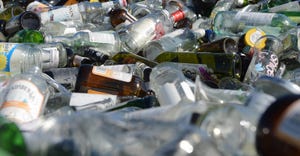Legal Lode: Pity Litter
Court won't criminalize a drop of kindness — this time.
December 1, 2010
Can humanitarian aid be a crime? Sometimes. But definitely not where the law is fuzzy, says a federal appeals court that overturned a conviction for “littering of garbage” on federal land.
Established in 1985, the 118,000-acre Buenos Aires National Wildlife Refuge protects endangered plant and animal species and offers visitor recreational opportunities. Situated in southern Arizona along the Mexican border, the refuge also is a popular passageway for illegal immigrants making their way north.
Federal officials say that three or four years ago, an estimated 250,000 illegal immigrants were crossing the refuge annually. As a result of the economic downturn, this illegal traffic declined considerably in 2008 and 2009 — to as few as 20,000 travelers a year.
Still, “over the past decade an increasing amount of refuge time and energy has been required to address the growing issue of illegal traffic entering the U.S. across refuge lands,” a government report says. “As a result, refuge lands have been marred by illegal trails and roads, litter and degraded habitat.”
The refuge’s arid, hilly landscape can be unforgiving. Between 2002 and 2009, after crossing into Arizona from Mexico, some 25 illegal immigrants died while trudging through the refuge toward what they believed would be a better life.
Under a federal special use permit, Humane Borders, a humanitarian organization, keeps several large water drums on the refuge, enabling immigrants to fill their own bottles. In addition, the Border Patrol has installed rescue beacons for distress calls from desperate migrants who, injured or abandoned, simply choose deportation over death.
Recently, another aid group, No More Deaths, joined the cause by putting gallon jugs of water along refuge trails. “We’d give water to anyone we found in the desert, even the Border Patrol,” retired minister Gene Lefebvre, who co-founded No More Deaths, told The New York Times.
In 2008, federal officers spotted a No More Deaths volunteer, Daniel Millis, placing plastic water bottles. When Millis ignored instructions to remove all the scattered jugs, he was cited for violating a regulation entitled “Disposal of Waste,” which bans the “littering, disposing, or dumping … of garbage … within any national wildlife refuge.” Millis admitted placing water containers on the trails, but argued that bottles of purified water did not constitute “garbage.” A federal district court found him guilty but suspended a fine or imprisonment.
By a 2-1 margin, an appellate panel reversed his conviction. Using the common meaning of “garbage” — discarded or useless material — the majority ruled that the regulation under which he was convicted is “ambiguous as to whether purified water in a sealed bottle intended for human consumption meets the definition of ‘garbage.’”
As a general rule, courts will not uphold a conviction based on a criminal statute expressed in vague or confusing language. For example, in June the U.S. Supreme Court held that former Enron chief Jeffrey Skilling and former newspaper magnate Conrad Black may have been wrongly convicted of “honest services fraud” because the federal law under which they were prosecuted was too vague when extended to situations not involving bribes or kickbacks.
Notably, the majority opinion makes it clear that Millis’s conviction would likely have been upheld if he had been charged under a different regulation, such as abandonment of property or failure to obtain the necessary permit.
[United States v. Millis, No. 09-10134, 9th Cir., Sept. 2, 2010]
Barry Shanoff is a Rockville, Md., attorney and general counsel of the Solid Waste Association of North America.
The legal editor welcomes comments from readers. Contact Barry Shanoff via e-mail: [email protected].
Related Stories
About the Author
You May Also Like


.png?width=300&auto=webp&quality=80&disable=upscale)

